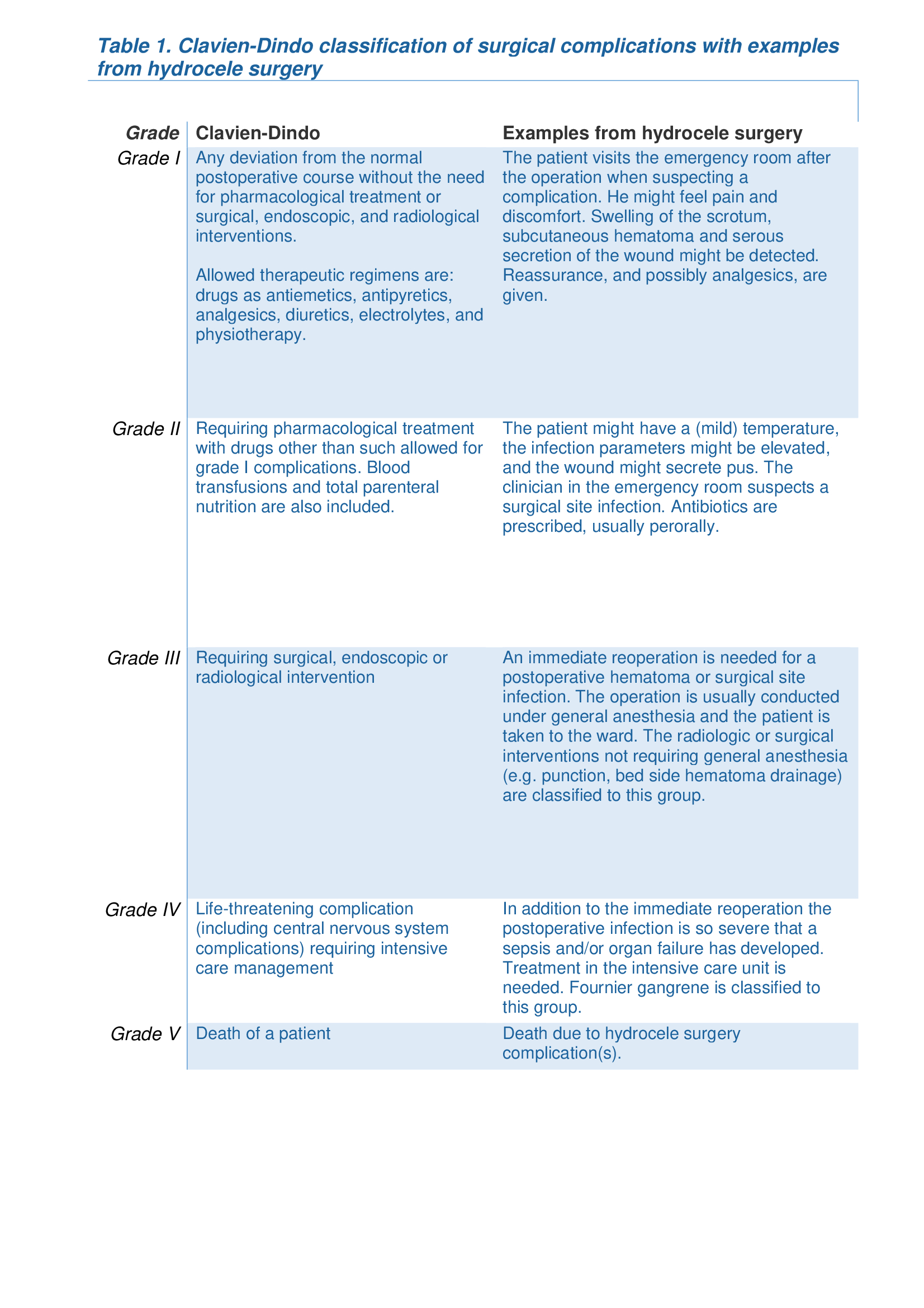Back
Poster, Podium & Video Sessions
Moderated Poster
MP37: Infections/Inflammation/Cystic Disease of the Genitourinary Tract: Prostate & Genitalia
MP37-15: A multicenter retrospective study assessing risk of complications in hydrocele surgery
Sunday, May 15, 2022
7:00 AM – 8:15 AM
Location: Room 225
Lauri Mäki-Lohiluoma*, Tuomas P. Kilpeläinen, Petrus Järvinen, Henna K. Söderström, Kari A.O. Tikkinen, Jukka Sairanen, Helsinki, Finland

Lauri M�ki-Lohiluoma
Helsinki University Hospital
Poster Presenter(s)
Introduction: Despite being one of the most common urologic procedures, the risk estimates for complications after hydrocele surgery (hydrocelectomy) are uncertain. Decision making between hydrocelectomy and aspiration-sclerotherapy involves balancing risk of complications with risk of recurrence, a trade-off that critically depends on the complication risks of hydrocele surgery. We conducted a multicenter study to examine the 90-day risks of complications of hydrocele surgery in a large, contemporary sample.
Methods: We retrospectively reviewed all hydrocele operations conducted in all five Helsinki (Finland) metropolitan area public hospitals between January 2010 and December 2018. We evaluated following outcomes during period of 90 days post-surgery: 1) Hydrocele surgery complications classified according to the Clavien-Dindo classification of surgical complications and 2) reoperations due to a surgical complication. We applicated the Clavien-Dindo classification to hydrocele surgery as illustrated in table 1. We recorded the length of stay for those patients readmitted to the ward.
Results: We identified 867 hydrocele operations (38 (4.3%) bilateral). A total of 219 (25.3%) patients had hydrocele surgery complications within 90 days post-surgery. Of these, 76 (8.8% of all; 35% of those who had complications) had Clavien-Dindo classified grade I complications, 80 (9.2%; 37%) grade II, 61 (7.0%; 28%) grade III, 2 (0.2%; 0.9%) grade IV and none grade V complications (Table 1). A total of 47 (5.4% of all; 21% of those who had complications) patients required immediate re-operation due to complications. Vast majority, 42 of the reoperations were due to bleeding. Many reoperated patients had multiple complications; i.e infected hematoma, hematoma and wound dehiscence. In total 51 (5.9%) patients were readmitted to the ward because of postoperative complications. One patient (0,1%) needed intensive care for 4 days. The median length of stay at the ward because of postoperative complications was 4days (range 1-24 days, IQR 5). The retrospective design of the study limits accuracy of the estimates.
Conclusions: Complications after hydrocele surgery are common and warrant further research of this condition. These estimates can be useful for shared decision making between clinicians and patients.
Source of Funding: The Sigrid Jusélius Foundation, and Competitive Research Funding of the Helsinki University Hospital (TYH2020248)

Methods: We retrospectively reviewed all hydrocele operations conducted in all five Helsinki (Finland) metropolitan area public hospitals between January 2010 and December 2018. We evaluated following outcomes during period of 90 days post-surgery: 1) Hydrocele surgery complications classified according to the Clavien-Dindo classification of surgical complications and 2) reoperations due to a surgical complication. We applicated the Clavien-Dindo classification to hydrocele surgery as illustrated in table 1. We recorded the length of stay for those patients readmitted to the ward.
Results: We identified 867 hydrocele operations (38 (4.3%) bilateral). A total of 219 (25.3%) patients had hydrocele surgery complications within 90 days post-surgery. Of these, 76 (8.8% of all; 35% of those who had complications) had Clavien-Dindo classified grade I complications, 80 (9.2%; 37%) grade II, 61 (7.0%; 28%) grade III, 2 (0.2%; 0.9%) grade IV and none grade V complications (Table 1). A total of 47 (5.4% of all; 21% of those who had complications) patients required immediate re-operation due to complications. Vast majority, 42 of the reoperations were due to bleeding. Many reoperated patients had multiple complications; i.e infected hematoma, hematoma and wound dehiscence. In total 51 (5.9%) patients were readmitted to the ward because of postoperative complications. One patient (0,1%) needed intensive care for 4 days. The median length of stay at the ward because of postoperative complications was 4days (range 1-24 days, IQR 5). The retrospective design of the study limits accuracy of the estimates.
Conclusions: Complications after hydrocele surgery are common and warrant further research of this condition. These estimates can be useful for shared decision making between clinicians and patients.
Source of Funding: The Sigrid Jusélius Foundation, and Competitive Research Funding of the Helsinki University Hospital (TYH2020248)


.jpg)
.jpg)